Contents:
Whether you’re taking A Levels or GCSEs, the Easter break is your chance to get stuck into revision and preparing yourself for summer exams. However, it’s easier said than done to pick up your textbooks and flashcards and actually start going over content. Here’s a few handy tips to give you a head start with your revision.
How much time should you spend on revision?
Without the structure of the school day, it can be difficult to motivate yourself to start putting in the hours each day into going over content. At the start of the holidays, it’s a good idea to figure out how much time you want to keep yourself accountable for revising each day − this amount is completely dependent on how you work best.
One of the benefits of learning on your own and revising away from school is that you can work when you work best. You may be a night owl and can’t possibly get anything done during the day. You might only be able to work before noon, and after that it’s all wasted time. Figure out what time of day you are most productive.
Generally speaking, there are two main ways of deciding how long you’ll spend on revision each day:
Time-based approach
First up, we have the time-based approach. It’s pretty simple − decide on the length of time you’ll dedicate to revision each day. You can either set yourself a uniform goal (e.g. “I’ll get five hours of work done each day”) or choose to study for different lengths of time on different days.
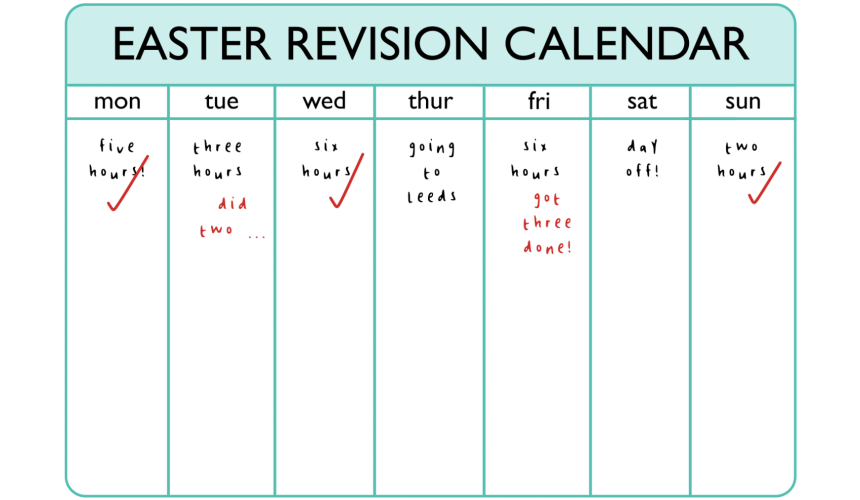
Some educational experts claim that seven hours a day is the perfect amount to try and cover each day. This makes sense, since it’s roughly equivalent to a typical school day plus daily homework. However this might seem like a daunting task for you to launch into away from the structure of school.
It might be better for you to initially set a slightly shorter time goal each day to find out what works best for you. Then, as the Easter holidays go on, you can work up to however many hours you can manage in a day.
Content-based approach
Alternatively, you may prefer to take a content-based approach to distributing work over the holidays. You could figure out the total amount of work you want to cover, and then assign topics or units to different days. This can be particularly useful at GCSE level, when you’ll be studying lots of different subjects.
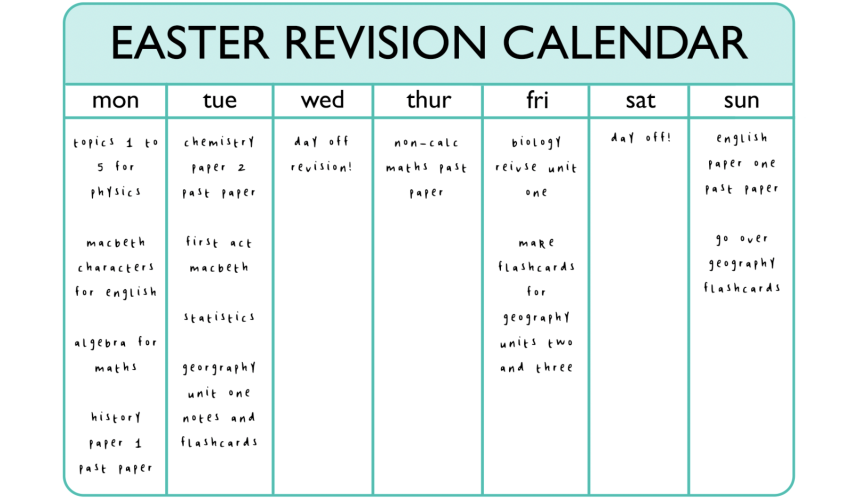
Using a content-based approach might mean that one day you work a couple more hours than another, but it’s an efficient way to make sure you’re covering everything you need to know before exam day.
Websites such as GetRevising and GoConqr can build you a timetable if you input all the content you wish to cover. Or you could go the more analogue to-do list route and just write out topics for each day.
What revision methods should you use?
There are so many methods out there which can aid you in your Easter revision. Using a combination of several techniques will likely give you the best results. It also makes revision a little more interesting that just reading the same facts again and again.
Exam questions
Going over real exam questions − especially in ‘exam conditions’ − is a must so that you can get used to the style of sitting exams. Even within the same subject, there will be slight differences between exam boards and how they present questions in exams − so make sure you’re using past papers from the correct board!
We have a database of exam questions for most subjects and exam boards at GCSE and A Level if you want a handy place to access past papers all in one place.
Try out some questions aided with your notes, and then without the support of your textbook. Keep practising and you’ll see your scores improve!
Flashcards
Flashcards are ideal for memorising key terms, short facts, or numbers. They don’t need to be old-school paper flashcards! Use sites like Quizlet to make electronic flashcards that you can practice in a number of formats.
There are pros and cons to using flashcards which you haven’t made yourself. Though making flashcards yourself can be very time-consuming, it can also be helpful for your memory to physically write or type out key terms yourself. Think about how much time you have and base your method off that!
Make sure you go over your flashcards frequently to consolidate your memory.
Mind maps
You can use mind maps in many ways. One classic use of mind mapping is to create a nice visual aid you can put around your room or refer to when completing past paper questions. They’re also helpful if you’re studying more science-based topics in which you’re looking at lots of inter-connecting concepts.
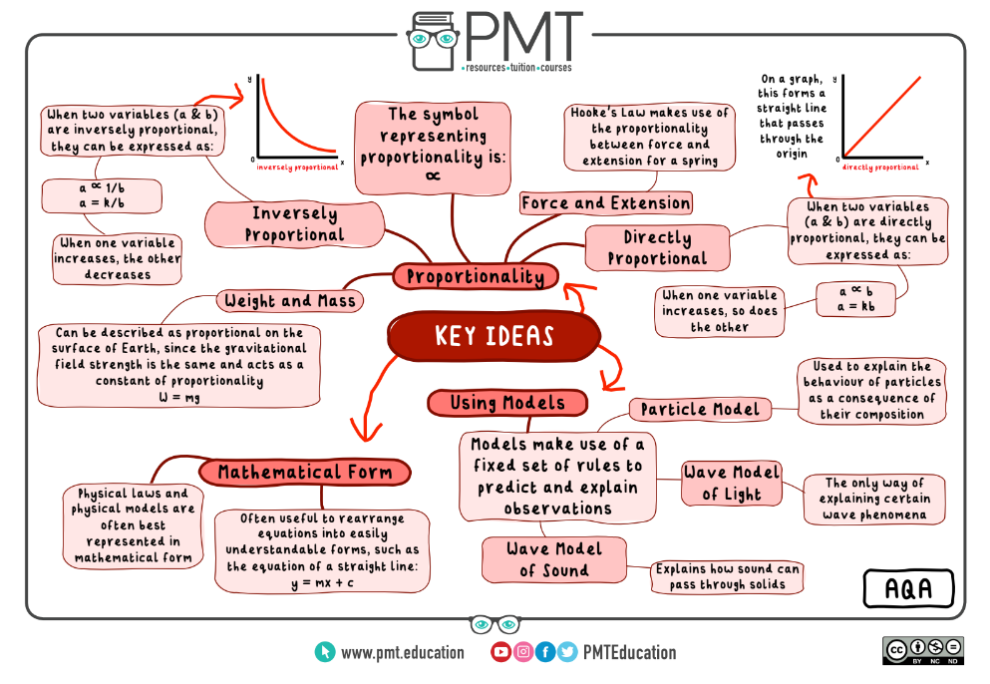
A PMT GCSE Physics mind map.
There are also more active ways you can use mind maps for revision. For example, you could do an activity where you mind map as much as you can remember from a topic (you could even do this in a set amount of time!) and then go back with the textbook and add in everything you missed with a different coloured pen. If you do this regularly, you should be able to improve the amount of content you can recall each time.
Though it’s best for muscle memory that you make your own mind-maps, if you’re low on time you can check out our free colourful, pre-made science mind maps.
Mnemonics and songs
A more musical and creative revision technique is creating mnemonics and songs as memory tools. This can be an effective way to learn a lot of information in one little jingle or sentence, especially if you make them up yourself!
For example, one of the most common mnemonics is SOHCAHTOA, which you’ve likely used to remember the ratios of sine, cosine, and tangent in trig questions.
You can also often find songs and mnemonics made by other students and even teachers on sites like Youtube.
Top revision tips
Pop notes around your room or house
If you write out key terms and facts you need to memorise and put them up on post-it notes around your room, then you’ll be constantly recapping important information you’ll need in your exams.
Pomodoro technique
Struggling to get your revision started? You might want to check out the Pomodoro Technique. This is when you study for 25 minutes, take a 5 minute break, and repeat. After four cycles of this, you take a longer break.
There’s lots of helpful sites that offer free automated Pomodoro timers.
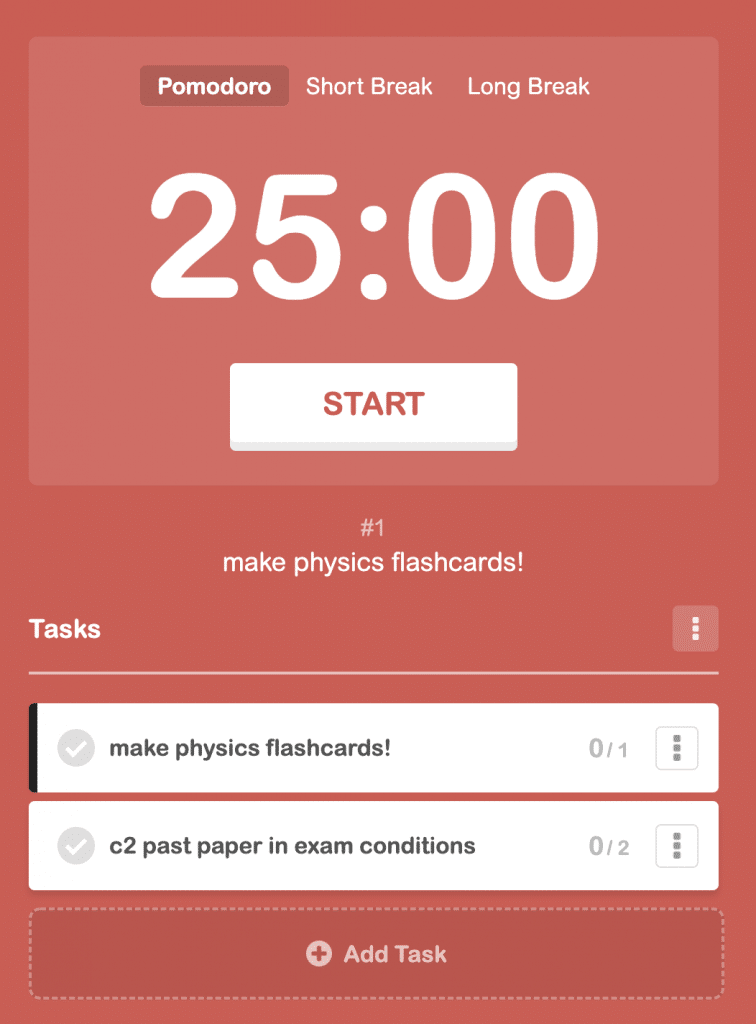
Pomofocus pomodoro timer.
Take regular breaks and look after yourself
The most important thing to keep in mind as you crack on with revision is to make sure you’re putting your mental and physical wellbeing first. Taking regular breaks, getting enough sleep, and doing some exercise will help you out during this stressful time.
Getting started with revision isn’t easy. From determining your daily revision time to exploring various revision techniques, we hope these strategies will help you make the most out of your Easter break and set you on the path to success. Remember, taking care of your wellbeing is crucial during this time, so don’t forget to prioritise self-care and regular breaks. Happy revising!

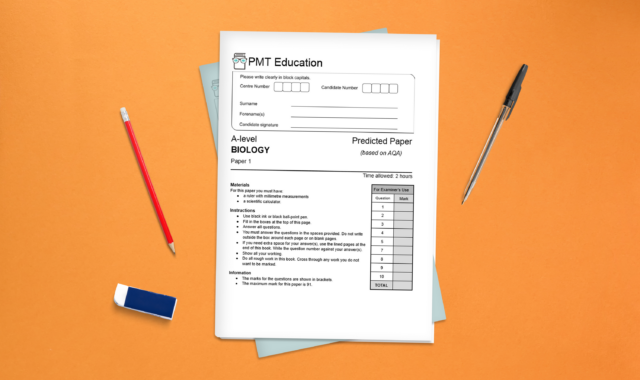


Comments